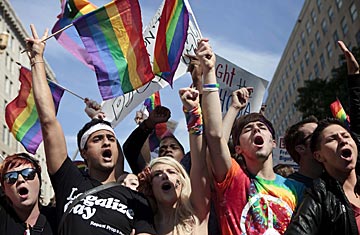
Activists protest to push the Obama Administration and Congress to live up to promises made to the lesbian, gay, bisexual and transgender community to advance civil rights in Washington on Oct. 11, 2009
Depending on whom you talk to, the Oct. 11 National Equality March drew between 100,000 and 200,000 people--estimates of crowds on the National Mall are notoriously unreliable, as anyone from Million Man Marchers to tea partyers can tell you. But one number you can take to the bank: the average age of the headset- and badge-clad event organizers was under 30. And that, by far, was the oddest thing about it. Why would a generation wired from birth to mobile phones and Facebook want to resurrect a form of political expression as fusty as a march on Washington?
The answer became clearer the more time I spent with Wayne Ting, who was born on Dec. 1, 1983, and--when he's not helping organize gay-rights events--works at a private-equity firm that he isn't quite convinced he wants to name. Like many other participants, Ting was shocked by the passage last year of Proposition 8, which ended the court-approved practice of extending equal marriage rights to gay couples in California.
"What Prop 8 did for my generation," he told me, "is that unlike past generations, we had never been through something where progress didn't seem inevitable. Suddenly some right that was given was taken back." It's a sign of how far this country has moved on gay issues that Ting and others perceived marriage not as a cause to aspire to, but as a battle that in some ways had already been won.
The macher behind the march was Cleve Jones, 55, a friend of assassinated gay-rights campaigner Harvey Milk's and the brains behind the AIDS quilt project. Jones, who had miscalculated on Prop 8 himself, was dejected by the outcome until a colleague suggested that the best way to ensure equal marriage rights was to demand them--Milk-style. Younger friends convinced him that a march on Washington could be organized via Facebook easily and comparatively cheaply. Still, marches require the movement of vast numbers of people across the nation, not to mention such mundanities as hotel rooms and Porta-Pottys. The idea that Gen Y gays would go for something so old school left Establishment gay-rights activists dumbstruck. "Pointless," a seasoned campaigner told me. "If Cleve and [co-organizer] David Mixner have really inspired so many kids to work on our behalf--finally, by the way, because I think these kids spent the early part of this decade playing Nintendo--why don't they tell them to go to [gay-marriage battleground states] Maine or Washington this weekend?"
Jones considers this a cynical view. He was there when Milk brought together thousands of young gays in pre-AIDS San Francisco to change that city's politics, and he thought that a coming together in Washington might spark the same kind of fellowship. Young gays who had connected on Facebook now wanted to meet face to face. The event would provide a way to do that and see Lady Gaga at the same time.
